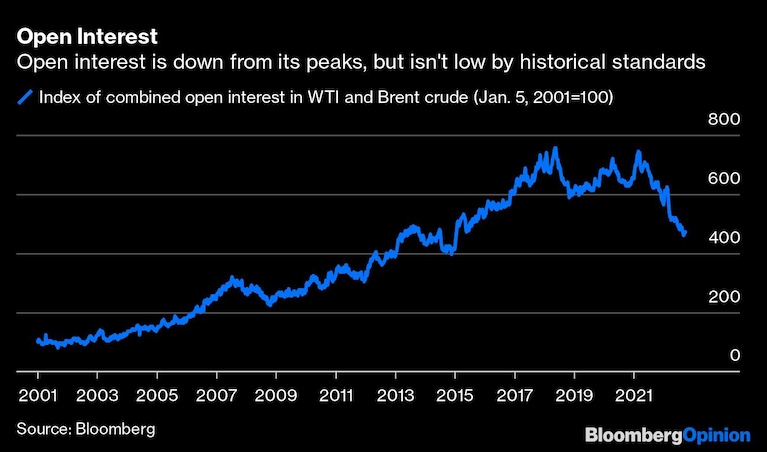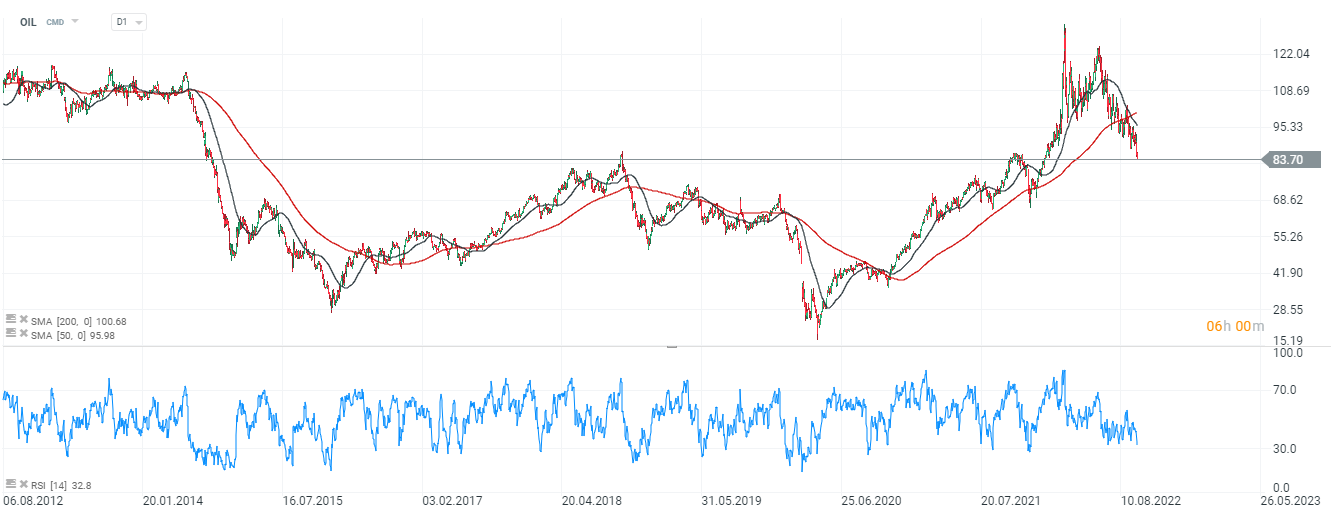Oil prices are clearly being weighed down by a strong dollar index at 20-year highs and fears of a global recession causing a drop in demand for crude. Currently, 2022 is among the 6 most volatile years in the oil market over the past 30 years. The price of brent crude dropped below $84 per barrel today:
- The oil market will hold its breath on October 5, when OPEC and OPEC+ meet. At the previous meeting, the groups reached an agreement in the form of a small production cut. A decision to drastically reduce production could theoretically support a price increase. On the other hand, OPEC+ is still deciding below its production target, so further cuts might not have a significant impact on actual;
- Data published last week indicated that OPEC+ countries failed to produce even 3.58 million barrels per day (target) in August, indicating an even greater shortfall than in the previous month;
- Global oil stocks are still relatively low after losses in 2021, when OPEC+ producers failed to keep up with increasing production for the massive demand resurgence after the pandemic. Additionally, sanctions on Russia could further hit available supply and petroleum products. The recession in Europe and the US could also affect China and dampen demand (decline in orders) for oil even if COVID restrictions are lifted in the Middle Kingdom;
- On the other hand, this is contradicted by the Baltic Dry Index, which tracks dry freight prices on the 20 most popular trade routes. The index has risen nearly 100% since the beginning of the month, which could herald resurgent demand in the global economy and more intensive trade, which could support a potential rebound in oil prices. As a rule, the index declines when trade between countries slows, which is reflected in the falling price of freight;
- An EU sanctions package banning Russian oil sales is set to begin in December under the G7 plan, which could tighten crude supply. Bloomberg reported Monday that the EU is having trouble agreeing on a cap on the price of crude, and unanimity has not been reached on the issue;
- If oil demand is not destroyed, it appears that 'black gold' still has a solid case for a rebound toward the psychological $100 per barrel limit. The physical supplier market remains tight, with physical crude prices diverging from the futures situation.
 The number of open positions in the oil futures market has fallen, but historically looking is still at high levels. Source: Bloomberg
The number of open positions in the oil futures market has fallen, but historically looking is still at high levels. Source: Bloomberg
 OIL chart, D1 interval. On the chart we can see how the 50-session average crossed the top of the 200-session average, which in technical analysis is referred to as a 'death cross', which usually heralds a prolonged weakening of demand and further declines. However, it is worth noting the high volatility of oil and the possible extended sanctions on Russian crude, which could further tighten supply and contribute to the rise in oil futures. Source: xStation5
OIL chart, D1 interval. On the chart we can see how the 50-session average crossed the top of the 200-session average, which in technical analysis is referred to as a 'death cross', which usually heralds a prolonged weakening of demand and further declines. However, it is worth noting the high volatility of oil and the possible extended sanctions on Russian crude, which could further tighten supply and contribute to the rise in oil futures. Source: xStation5

Reggeli összefoglaló: Globális eladási hullám a technológiai szektorban (13.02.2026)

Reggeli összefoglaló (12.02.2026)

Az ezüst 3%-kal emelkedett 📈 Visszatér a bullish momentum a nemesfémek piacán?

Live Trading - 2026.02.10.
Ezen tartalmat az XTB S.A. készítette, amelynek székhelye Varsóban található a következő címen, Prosta 67, 00-838 Varsó, Lengyelország (KRS szám: 0000217580), és a lengyel pénzügyi hatóság (KNF) felügyeli (sz. DDM-M-4021-57-1/2005). Ezen tartalom a 2014/65/EU irányelvének, ami az Európai Parlament és a Tanács 2014. május 15-i határozata a pénzügyi eszközök piacairól , 24. cikkének (3) bekezdése , valamint a 2002/92 / EK irányelv és a 2011/61 / EU irányelv (MiFID II) szerint marketingkommunikációnak minősül, továbbá nem minősül befektetési tanácsadásnak vagy befektetési kutatásnak. A marketingkommunikáció nem befektetési ajánlás vagy információ, amely befektetési stratégiát javasol a következő rendeleteknek megfelelően, Az Európai Parlament és a Tanács 596/2014 / EU rendelete (2014. április 16.) a piaci visszaélésekről (a piaci visszaélésekről szóló rendelet), valamint a 2003/6 / EK európai parlamenti és tanácsi irányelv és a 2003/124 / EK bizottsági irányelvek hatályon kívül helyezéséről / EK, 2003/125 / EK és 2004/72 / EK, valamint az (EU) 2016/958 bizottsági felhatalmazáson alapuló rendelet (2016. március 9.) az 596/2014 / EU európai parlamenti és tanácsi rendeletnek a szabályozási technikai szabályozás tekintetében történő kiegészítéséről a befektetési ajánlások vagy a befektetési stratégiát javasló vagy javasló egyéb információk objektív bemutatására, valamint az egyes érdekek vagy összeférhetetlenség utáni jelek nyilvánosságra hozatalának technikai szabályaira vonatkozó szabványok vagy egyéb tanácsadás, ideértve a befektetési tanácsadást is, az A pénzügyi eszközök kereskedelméről szóló, 2005. július 29-i törvény (azaz a 2019. évi Lap, módosított 875 tétel). Ezen marketingkommunikáció a legnagyobb gondossággal, tárgyilagossággal készült, bemutatja azokat a tényeket, amelyek a szerző számára a készítés időpontjában ismertek voltak , valamint mindenféle értékelési elemtől mentes. A marketingkommunikáció az Ügyfél igényeinek, az egyéni pénzügyi helyzetének figyelembevétele nélkül készül, és semmilyen módon nem terjeszt elő befektetési stratégiát. A marketingkommunikáció nem minősül semmilyen pénzügyi eszköz eladási, felajánlási, feliratkozási, vásárlási felhívásának, hirdetésének vagy promóciójának. Az XTB S.A. nem vállal felelősséget az Ügyfél ezen marketingkommunikációban foglalt információk alapján tett cselekedeteiért vagy mulasztásaiért, különösen a pénzügyi eszközök megszerzéséért vagy elidegenítéséért. Abban az esetben, ha a marketingkommunikáció bármilyen információt tartalmaz az abban megjelölt pénzügyi eszközökkel kapcsolatos eredményekről, azok nem jelentenek garanciát vagy előrejelzést a jövőbeli eredményekkel kapcsolatban.


